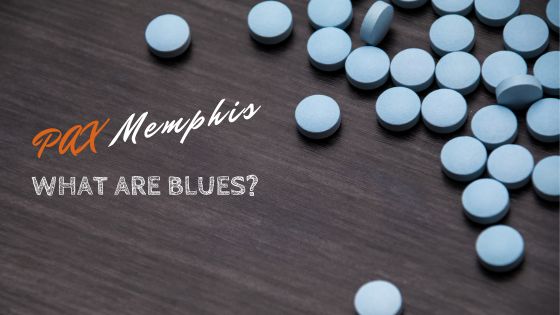The United States is in the midst of a growing opioid epidemic. Each year, tens of thousands of people die from opioid-related overdoses, and many more suffer from severe complications and the consequences of life-threatening addiction.
In recent years, health experts have become more concerned about “blues,” which are a kind of counterfeit opioid pills. Drug dealers make these pills so that they look like authentic prescription drugs, but they actually contain dangerous–sometimes lethal–doses of fentanyl.
Understanding the danger of “blues” and the risks of opioid abuse is critical to helping people get the life-saving treatment they need. This article will explore what blues are, how to recognize them, and how to seek help for opioid abuse. Reach out to the PAX Memphis team to learn about our supportive substance abuse treatment programs or for guidance during any stage of recovery.
What are Blues?
“Blues” are another name for M30s, which are prescription pills that contain 30mg of oxycodone. M30s are called blues because the pills are blue. They also have an “M” stamped on one side and the number 30 on the other.
Illicit drug manufacturers create counterfeit versions of prescription opioids, including M30s. These counterfeit drugs are often nearly identical to prescription OxyContin but contain different ingredients. Fake M30s often contain fentanyl, a potent, dangerous opioid. Opioid users may unknowingly buy counterfeit blues that contain lethal doses of fentanyl.
Public health experts believe that blues and other counterfeit opioid pills are a significant factor in the country’s opioid crisis.
What are the Effects and Dangers of Blues?
People who buy opioids illegally are at risk of receiving counterfeit blues containing fentanyl. Fentanyl is estimated to be 50 times stronger than heroin and 100 times stronger than morphine. The dangerous effects of fentanyl include:
- Nausea
- Vomiting
- Headache
- Constipation
- Dizziness
- Confusion
- Fever
- Insomnia
- Dry mouth
- Nightmares
- Seizures
- Death
The risk of opioid overdose is significant when people take counterfeit opioids like blues or M30s. Some of the signs of an opioid overdose include:
- Confusion
- Slurring
- Pale or clammy skin
- Blueish lips and fingernails
- Slow or shallow breathing
- Slow heart rate
- Loss of consciousness
Combining opioids and other substances, like cocaine, alcohol, and benzodiazepines, increases the risk of overdose.
An opioid overdose is a life-threatening emergency. If someone near you is exhibiting signs of an overdose, call 911. Administer naloxone (Narcan) if available and wait with the person until EMS arrives.
Preventing Counterfeit Opioid Use
Misusing opioids puts people at risk for unintentional fentanyl exposure from counterfeit blues. It’s impossible to determine exactly what you are taking when you buy opioids illegally. Drug traffickers often add other substances to the drugs they sell to increase their profits. This practice puts users at risk of serious harm. To avoid this risk, you must avoid illegal drugs altogether. Do not use opioids unless you have a prescription, and seek treatment for opioid abuse if you take them without a prescription.
The risk of unintentional opioid overdose and exposure to counterfeit opioids increases as people develop dependence and addiction to opioids. Recognizing opioid abuse and addiction is the first critical step in getting help to stop using opioids and learn the skills to avoid relapse for life.
Recognizing Opioid Addiction
Anyone who uses opioids–even those who take it with a prescription–can develop dependence and addiction. It’s important to identify signs of opioid abuse and addiction and seek treatment immediately.
Some common signs of opioid addiction include:
- Using opioids for longer than prescribed
- Taking opioids differently than your doctor told you to–taking larger or more frequent doses or taking it differently, such as crushing and snorting your pills
- Having more than one prescription for opioids from multiple doctors
- Neglecting relationships, hobbies, and responsibilities
- Legal or financial trouble related to opioid use
- Engaging in dangerous activities while using opioids, such as driving under the influence or having risky sex
- Needing to use more of an opioid drug to get the desired effects
- Experiencing withdrawal symptoms if you stop using opioids
- Continuing to use opioids even when they harm your health, emotional well-being, and relationships
Opioid addiction treatment can be effective, and recovery is possible. If you or someone you love exhibits signs of opioid abuse or addiction, seek professional help right away.
Treating Opioid Addiction
Opioid addiction is often a complex condition that involves a person’s physical health, emotional well-being, behaviors, and environment. Detox programs can help people manage withdrawal symptoms and address the physical components of their addiction, but it is important to continue treatment after completing detox.
Comprehensive addiction treatment programs provide evidence-based therapies to help people understand and treat the complex roots of their substance use, including:
- Relapse-prevention education
- Individual counseling
- Group therapy
- Family therapy
- Medications
- Mental health treatment
- Aftercare planning
- Exercise, nutrition support, yoga, massage, and other holistic therapies
Treating all aspects of a person’s addiction–not just the physical aspects–can help them have a longer-lasting recovery and a better chance at lifelong sobriety.
Get Help Now
If you or someone you love struggles with opioid abuse, you are not alone. Contact the PAX Memphis team to get the support and treatment you need and deserve. Don’t wait another day for help. Call today to start your recovery journey.
Medically Reviewed: September 25, 2019

All of the information on this page has been reviewed and verified by a certified addiction professional.










